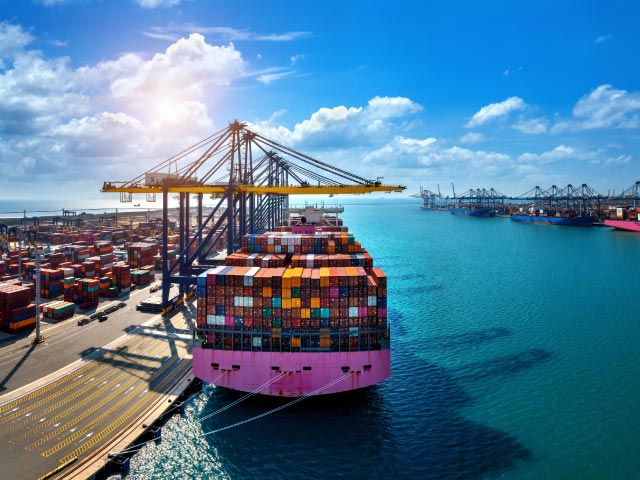Key figures for the sector in 2025
Global maritime trade in 2024 amounts to more than 14 billion tons, with maritime transport ensuring more than 80% of the volume of world commodity trade.
In 2024, the entire sector faces a shortage of 90,000 officers, according to BIMCO. This is related to the requirement of new skills.
Analyse PESTEL
Politics
Maritime transport is one of those that remains the most impacted by the various geopolitical tensions. In 2024, the conflict in Yemen and the various attacks on merchant ships profoundly changed the order of passage on the roads, with trips sometimes extended by 15 days, causing major delays in logistics.
The United States and Europe are also concerned because China is investing in a large number of ports around the world to assert its place as a trade leader. For other countries, this marks an increased dependence on China, and is therefore an attack on their economic sovereignty.
Finally, still at the political level, Russia has suffered a large number of economic sanctions since the war in Ukraine and this tends to change maritime flows worldwide. Companies are forced to navigate in a context where constraints and regulations continue to evolve and this has negative impacts on profitability. Some countries are experiencing a significant increase in protectionism and this has an impact on customs controls, so unloading times are considerably extended.
Economic
At the economic level, maritime trade grew by 2.4% in 2023, recording a total of 12.3 billion tons of transported goods in the same year. In 2024, an increase of 1.8% took place, despite political disruptions. The increase is expected to be constant for at least five years.
It should also be noted that the Red Sea crisis has caused a large increase in tariffs. Thus, in March 2024, some Asia/Europe containers can reach more than $9,000, while in normal times, they are at $2,000.
In addition, the market is owned by 10 companies, which are the largest, and which control the sector at more than 80%. Today, the MSC group is the world's leading shipowner.
The environment, as we will also see later, has economic impacts. Thus, to meet the new requirements, investments are increasingly important. Actors try to navigate thanks to LNG for example, and many are generally looking for greener fuels. In 2024, investments exceed $40 billion.
Sociological
Consumers exert greater influence today because they want greater transparency towards the goods they receive, especially with regard to environmental issues.
On the net, NGOs will regularly publish which ships are the most polluting, and this of course has a negative impact on the companies concerned.
Gradually, the pressure of what the public will think commits companies to define more responsible practices, such as respect for workers' rights in particular, improving life on boats, and reducing discrimination. Some ships have experienced controversy, related to non-payment of wages or forced labor. Today, this is increasingly being pointed out.
Finally, the digitization of ports and ships is profoundly changing the maritime landscape, as well as the professions of the sector. Today more than ever, skills require more technicality, so training also differs.
Shipping companies are now experiencing recruitment problems, especially with regard to qualified officers. As we said above, according to BIMCO there would be a lack of more than 90,000 officers in the world.
Technological
The energy transition is forcing shipping companies to look for alternative fuels, which has become a priority around the world.
New technologies are increasingly present in the sector and are changing the way employees work throughout the sector. There are now technologies that make it possible to track liners in real time, and artificial intelligence is also evolving, in order to allow more efficient management of maritime flows.
IBM, for example, or TradeLens, have revolutionized the sharing of data between the different actors in the supply chain, allowing optimization of production and global organization in the world.
There are now more and more ports that are investing in robotization systems for loading. The main objective is to use this type of technology to save time and reduce human error.
Ecological
Pressures are multiplying in terms of compliance with ecological standards. The International Maritime Organization imposes a number of criteria by 2030 and 2040. New ecological indices have also emerged, such as the CII, Carbon Intensity Indicator.
There are many factors that can affect biodiversity, oil spills, but also chemicals and noise. Pollution is very important in some areas. Finally, climate change plays on the ecological side, with the gradual rise in sea level, tropical storms, all this can damage ships and create accidents.
Legal
Maritime law is governed by a number of laws and regulations.
There are many conventions at the global level, such as SOLAS, which manages the safety of ships, MARPOL, which deals with pollution.
In addition, since January 2024, the EU has integrated the maritime transport sector into its carbon market, the ETS. Gradually, this rule could be extended to other continents.
Finally, it should be noted that shipowners are held responsible, in certain circumstances, if there is pollution or in the event of accidents. However, the procedures are very complicated and very expensive.
Conclusion
In 2024, the shipping sector is experiencing profound upheavals, whether because of the geopolitical situation, environmental changes, or new technologies. The sector has been subjected to societal and political pressures.
However, it is also a sector that has many opportunities, because the companies that will be able to withstand the pressures and develop greener measures will be the ones that will make a difference and dominate the market in the years to come. Of course, the legal framework remains increasingly strict, but it is still an opportunity to accompany the entire sector towards a better transition, towards a cleaner sector.
http://www.maritimetransport.com/
https://www.cevalogistics.com/en/glossary/maritime-transport









